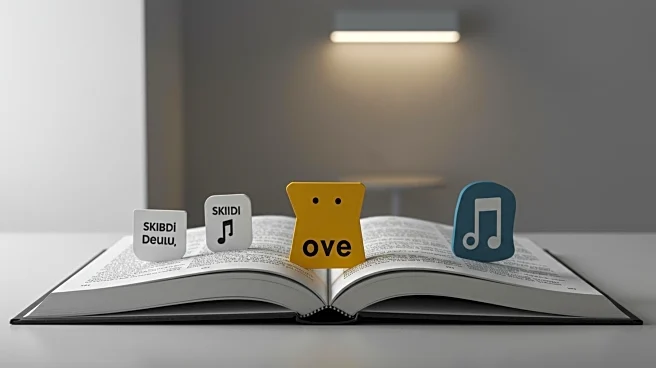What's Happening?
The Cambridge Dictionary has recently incorporated over 6,000 new words and phrases, highlighting the influence of internet culture on the English language. Among these additions are terms like 'skibidi,' 'delulu,' and 'tradwife,' which have gained popularity through social media platforms and viral content. 'Skibidi' is a nonsense word from the YouTube series Skibidi Toilet, 'delulu' is shorthand for delusional, and 'tradwife' refers to women who embrace traditional gender roles on platforms like TikTok and Instagram. Other new entries include 'lewk,' a distinctive fashion look, 'inspo,' short for inspiration, and 'mouse jiggler,' a term for someone pretending to work remotely. The dictionary also added 'forever chemicals,' referring to persistent man-made substances in the environment. Colin McIntosh, Lexical Programme manager at Cambridge Dictionary, noted the unusual nature of these additions, emphasizing their potential staying power and the fascinating impact of internet culture on language.
Why It's Important?
The inclusion of these terms in the Cambridge Dictionary underscores the significant role of internet culture in shaping modern language. As social media and digital platforms continue to evolve, they introduce new vocabulary that reflects contemporary societal trends and behaviors. This linguistic shift has implications for communication, education, and cultural understanding, as it bridges generational gaps and adapts to the rapid pace of technological advancement. The recognition of these terms by a reputable dictionary validates their usage and ensures their place in formal language, impacting how future generations will communicate and understand cultural references.
What's Next?
The ongoing evolution of language driven by internet culture suggests that dictionaries will continue to adapt and expand their entries to accommodate new terms. As digital communication platforms grow, they will likely introduce more words that capture emerging trends and societal changes. This dynamic process may influence educational curricula, prompting updates to language teaching methods to include contemporary vocabulary. Additionally, businesses and media may leverage these terms to connect with younger audiences, reflecting their understanding of current cultural phenomena.
Beyond the Headlines
The addition of internet-driven terms to the dictionary raises questions about the permanence and legitimacy of language influenced by digital culture. It challenges traditional notions of language evolution, where words typically gain acceptance through prolonged usage and cultural significance. This shift may lead to debates about the criteria for dictionary inclusion and the balance between preserving linguistic heritage and embracing modern expressions. Furthermore, it highlights the role of social media as a powerful tool in shaping public discourse and cultural identity.











